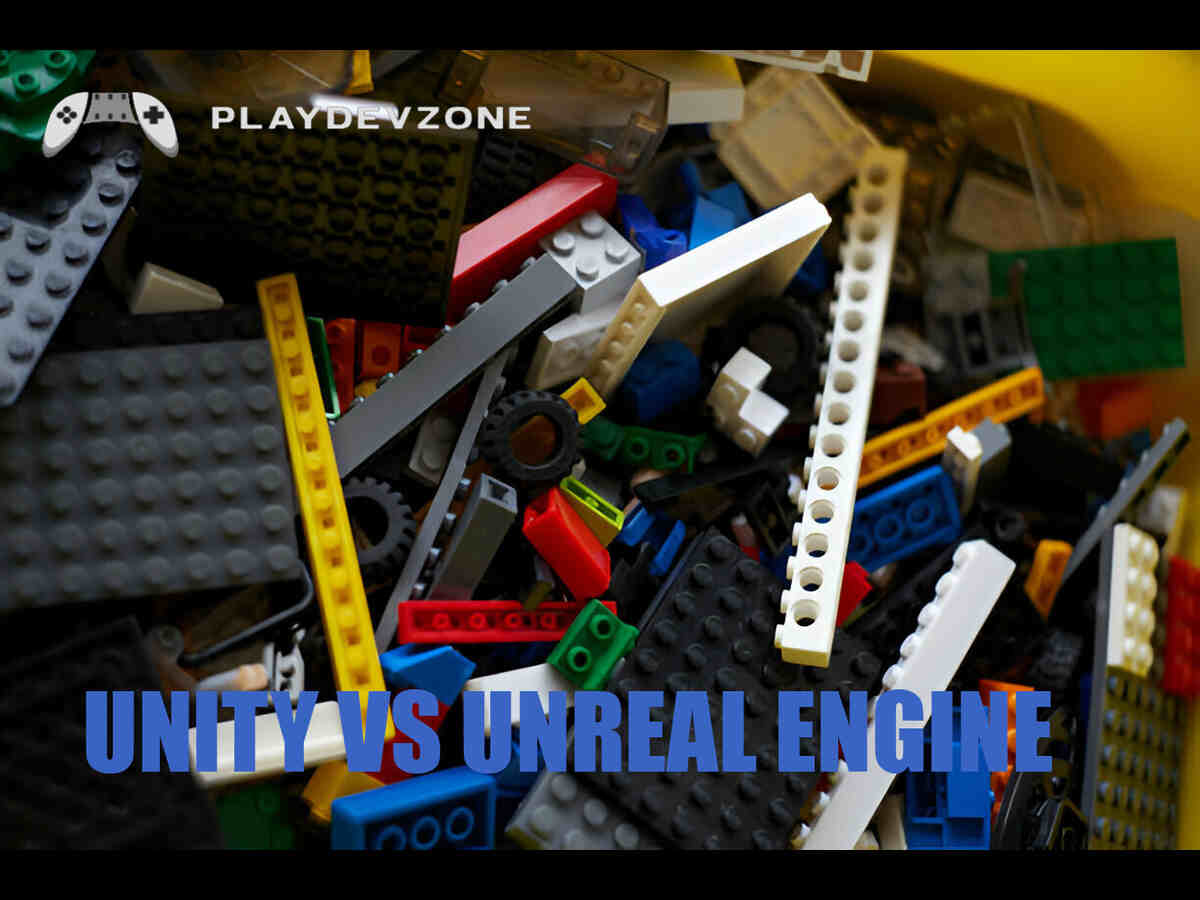Introduction
Choosing the right game engine is one of the most critical decisions a developer can make, especially when building engaging 2D games.
With the rapid evolution of game development platforms, the debate between Unity vs Unreal Engine 5 for 2D games has become more relevant than ever.
Both engines offer powerful tools, stunning visuals, and robust performance, but they cater to different needs and skill levels.
Unity has long been a favorite for indie developers and mobile game creators due to its lightweight setup and extensive support for 2D game development (Unity VS Unreal Engine 5 For 2D Games).
On the other hand, Unreal Engine 5, widely known for its 3D and AAA game capabilities, is rapidly expanding its features to support 2D game developers while also offering high-end rendering and advanced physics.

Which One Should Indie Developers Choose?
Unity's lightweight engine enables developers to build highly optimised 2D games that run smoothly across devices, even on low-end, low-end hardware.
This makes it ideal for mobile, web, and indie PC releases.
Unreal Engine 5, by contrast, is built for high-fidelity 3D rendering, which can be excessive for most 2D projects (Unity VS Unreal Engine 5 For 2D Games).
Although optimisation is possible, it often requires additional effort to scale Unreal's architecture down for 2D performance.
For most indie developers seeking smooth performance without excessive technical adjustments, Unity provides a more balanced and practical experience.
2D Game Development Showdown: Unity vs Unreal Engine 5 in 2025
In 2025, Unity’s continued reliance on C# stands out as a major advantage for 2D game developers seeking a familiar and efficient coding experience.
It's straightforward, beginner-friendly, and supported by an enormous knowledge base.
Unreal Engine 5 offers Blueprint visual scripting, but adapting it for 2D can be unintuitive.
C++ coding in UE5 introduces additional complexity, which may intimidate small teams or solo developers (Unity VS Unreal Engine 5 For 2D Games).
Unity's editor is lightweight and faster to navigate, making daily workflows smoother and more efficient.
For those prioritising development speed and ease of iteration, Unity continues to provide a cleaner and more approachable environment.
Why Unity Still Leads Over Unreal Engine 5 in 2D Game Development
When asking why Unity still leads over Unreal Engine 5 in 2D game development, the answer lies in its toolset.
Unity offers dedicated 2D systems, such as Sprite Renderer, Tilemap, and 2D Animation tools, specifically designed for efficient 2D workflows.
These tools help developers quickly build levels, animate characters, and manage assets with ease.
Unreal Engine 5, while visually powerful, still relies on the outdated Paper2D system, which lacks consistent updates and community support.
For developers focused solely on 2D gameplay, Unity offers a faster and more intuitive development pipeline.
Unreal Engine 5 for 2D Games: Can It Compete with Unity?
Is Unreal Engine 5 a viable contender against Unity when it comes to developing 2D games? The answer depends on project needs.
UE5 excels in visual fidelity, offering advanced lighting, post-processing, and shading options that can bring 2D or 2.5D games to life in cinematic quality.
Developers looking to create a hybrid-style game that combines 2D gameplay with 3D elements may find UE5's rendering pipeline a valuable asset (Unity VS Unreal Engine 5 For 2D Games).
However, while it offers power and beauty, these features are often excessive for traditional 2D development.
Unity still holds an edge in simplicity, speed, and tailored 2D tools.
Unity vs Unreal Engine 5: The Best Engine for Your Next 2D Mobile Game
When comparing Unity vs Unreal Engine 5: the best engine for your next 2D mobile game, Unity comes out ahead in mobile optimization.
Unity is built with mobile platforms in mind, supporting Android and iOS with low file sizes, smooth performance, and quick build times (Unity VS Unreal Engine 5 For 2D Games).
Unity's 2D toolkit is lightweight and ideal for resource-constrained devices, while its adaptive UI system ensures a seamless player experience across screen sizes.
Unreal Engine 5, though powerful, is heavier and primarily focused on high-end 3D graphics, which aren't practical for most 2D mobile games.
FAQ (Frequently Asked Questions)
Is Unity or Unreal better for 2D?
When comparing Unity and Unreal Engine for 2D game development, Unity is generally the better choice.
Unity offers a robust and user-friendly 2D development environment, featuring tools such as the 2D Tilemap Editor, Sprite Renderer, and Cinemachine for precise camera control.
It also supports a wide range of platforms and features a vast library of assets in the Unity Asset Store.
While Unreal Engine excels in delivering high-end 3D visuals, it may be too resource-heavy for basic 2D projects.
On the other hand, Unity offers a lightweight runtime and strong community support, making it a top choice for indie creators and mobile game developers.
Additionally, Unity's C# scripting language is easier to learn for beginners compared to Unreal's C++.
Can Unreal Engine 5 be used for 2D games?
Yes, you can create 2D games with Unreal Engine 5, but it's not specifically optimized for 2D development, making other engines a more practical choice.
UE5 is primarily designed for high-end 3D games with advanced graphics and physics (Unity VS Unreal Engine 5 For 2D Games).
While it supports 2D development through Paper2D, this feature hasn't received major updates recently.
Developers can still create 2D games in UE5, but the process can be more complex compared to engines like Unity or Godot.
If you're aiming for rich visuals in 2D with some 3D effects, Unreal might work.
However, for simpler 2D projects, Unity is typically more efficient.
Still, UE5's power and flexibility offer creative opportunities for experienced developers exploring hybrid 2D/3D styles.
Does Unity work for 2D games?
Yes, Unity is a great platform for developing 2D games, offering powerful tools and a user-friendly workflow.
It offers a powerful 2D engine with tools like Sprite Renderer, Tilemap, and Physics2D, making it easy to design and build 2D games.
Unity supports multiple platforms, including Android, iOS, and PC, allowing developers to reach a broad audience.
Its user-friendly interface and large asset store make it ideal for both beginners and professionals.
Whether you're creating a side scroller, puzzle, or arcade game, Unity provides everything you need for successful 2D game development.
What is the easiest game engine to make 2D games?
The easiest game engine to make 2D games is often considered to be Unity.
With its user-friendly interface, built-in 2D tools, and C# scripting, Unity is ideal for beginners and indie developers.
It offers features such as the 2D Tilemap system, Sprite Editor, and drag-and-drop functionality, making development fast and efficient (Unity VS Unreal Engine 5 For 2D Games).
Additionally, Unity supports multiple platforms, including Android, iOS, and PC.
For those new to game development, Unity offers a smooth learning curve, strong community support, and a vast library of tutorials and assets, making it the ideal choice for both easy and professional 2D game creation.
Is Unreal Engine good for beginners?
Unreal Engine is suitable for beginners, especially those interested in creating high-quality 3D games and visuals.
It offers the Blueprint visual scripting system, which enables new developers to create games without requiring extensive coding knowledge.
However, its interface and powerful features can feel overwhelming at first.
For 2D or simpler projects, engines like Unity might be easier to start with (Unity VS Unreal Engine 5 For 2D Games).
That said, Unreal Engine's free access, robust documentation, and high-end tools make it an excellent long-term choice for beginners aiming to grow into professional game development, especially in the AAA or 3D gaming space.
Is Unity better for 2D than Unreal?
Yes, Unity is generally better for 2D game development than Unreal Engine.
Unity offers a dedicated 2D workflow, including tools like the Sprite Renderer, Tilemap system, and 2D Physics, making it ideal for creating 2D games efficiently.
Its lightweight performance, simple interface, and C# scripting are beginner-friendly and widely supported (Unity VS Unreal Engine 5 For 2D Games).
Unlike Unity, Unreal Engine is primarily built for high-end 3D visuals, which can make it excessive for simpler 2D game development.
When it comes to mobile, indie, or casual 2D games, Unity stands out with its quicker development workflow, strong asset ecosystem, and active community making it the go-to engine for 2D developers.
Which Engine is Better for Beginners in 2025?
In 2025, Unity remains one of the best game engines for beginners, thanks to its intuitive interface, strong community support, and vast educational resources.
Unity offers a beginner-friendly experience with drag-and-drop features, a robust 2D and 3D toolkit, and scripting in C#, which is widely considered easier to learn than C++, the language used by Unreal Engine.
Whether you're building mobile games, 2D side-scrollers, or even simple 3D projects, Unity provides a flexible and accessible platform for newcomers.
However, Godot Engine is also rapidly gaining popularity among beginners.
It's lightweight, open-source, and features its scripting language, GDScript, which is similar to Python, making it ideal for beginners.
Godot's interface is clean and easy to navigate, supporting both 2D and 3D game development with minimal setup (Unity VS Unreal Engine 5 For 2D Games).
While Unreal Engine 5 offers stunning graphics and a powerful visual scripting system (Blueprints), it may be overwhelming for true beginners due to its complexity and hardware demands.
In summary, for beginners in 2025, Unity and Godot are the best engines to start with unity for its versatility and industry demand, and Godot for its simplicity and open-source freedom.
Conclusion
When comparing Unity vs Unreal Engine 5 for 2D games, Unity stands out as the more efficient and beginner-friendly choice.
Its dedicated 2D tools, lightweight performance, and wide platform support make it ideal for 2D development (Unity VS Unreal Engine 5 For 2D Games).
While Unreal Engine 5 excels in high-end 3D projects, it may be too complex for most 2D needs.
For faster workflows, ease of use, and a strong community, Unity is the better engine for 2D game developers in 2025.

